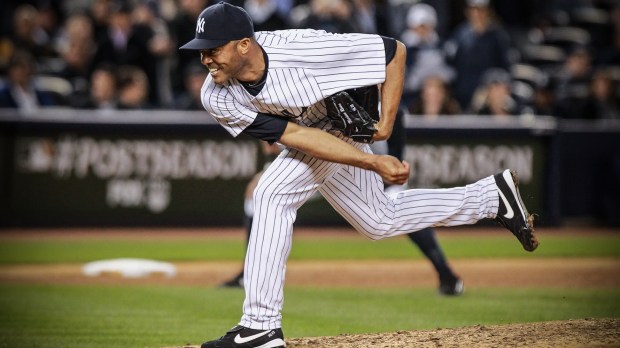It was 2003. Eight innings into yet another nail-biter of a series between the Boston Red Sox and the New York Yankees, there came a guttural wail from the stands at Fenway Park.
“For the love of God … ”
It was one lone voice. A man — whose sound was remarkably reminiscent of the late Chris Farley at his most passionately unhinged — was seated close enough to the announcer’s booth that his agony was picked up and broadcast in New York.
“For the love of God … ” he cried, again and again, as one Bosox batter after another swung and missed, and looming before him was a ninth inning full of Mariano Rivera at his peak.
Watching at home, my son and I heard a hated rival’s naked pain, and we hooted in what might be called cruel appreciation.
Baseball fans understand each other’s afflictions. We could laugh in that moment, because our team was winning, but we recognized all too well the sound of anguish emanating from Beantown; we had felt it enough, in the Bronx. When the umpire called strike three at the third out, the single voice dissolved into a bellow of incoherent angst and three hundred miles away we knew the man had slumped into his chair with his head in his hand, and his heart full of hate; not for the Yankees — that was a given — but for his own team, and for the game of baseball itself, of which the late commissioner A. Bartlett Giammati once wrote, “It breaks your heart. It is designed to break your heart.”
The heartbreak is what makes it great, and the source of the heartbreak is the clutch — that period of time (and it can last for a moment or for years) when everything meaningful in your life fades into a peripheral nothingness until an outcome is known. In the clutch, love is balancing — one foot, en pointe — along a thin wire of hope and still determining if or when the next foot might be safely employed.
The clutch makes us hold our breath in the name of love. It is the biopsy report we are waiting to hear about on our husband; it is what keeps us from fully sleeping until we hear our kid pull into the driveway; it is the acknowledgment that we lack control over an outcome, and the wondering that comes before the knowing. Within the clutch are contained all the possibilities of our wild imaginings, and it is in those imaginings that we find ourselves hating the object of our love, for making us care so deeply.
Only love can sink us into screaming, ruinous despair while in the depths of a clutch, and of all sports, only baseball can so routinely wear us down to that place.
The absence of a clock has something to do with it; a hockey fan can look at the clock and understand that his tension will end in three minutes — now two, now one. A football fan can watch a team strategically meander around the field while crucial seconds flow away like the swift sands of Araby. But a fan of baseball has only framed innings to look at, and when a score is close, or tied, the threat of an infinite, stretched-out limbo of suffocating suspension.
I once spent eighteen months in one of those limbos — from the moment a lie was told about someone I loved, until an eventual admission and subsequent finding turned the wrong into a right. While in suspense, lacking control over the outcome, giving in to anger and worry, I stressed myself into a case of shingles, and then could only laugh at myself in my foolishness. The eruption on my skin was simply the product of my increasingly volcanic resentment over an injustice, and it was rooted in love clutched too dearly to myself — and thus rendered toxic — rather than surrendered to a healthier recognition of all I could not control, and then released in trust.
For it is only in surrender that the clutch is resolved. Eventually, a pitcher must release the ball from his callused fingers and send it spinning into the arcane triune powers of physics, probability, and pure skill, and the batter must commit to an outcome with both swing and stride, or nothing will ever become resolved.
Baseball is a game of inches. And hours. And in those moments between release and resolution are contained particles of infinity — the space between a prayer of supplication and the surrender of “amen”; the whisper of intention that brings what is empty and void into fullness. The hope for redemption.
We can relate to that just as we can identify with pitcher and batter; the individual confronting a full team of resistance with the humblest of weapons — a ball, a stick — speaks to our daily grinds, the resistance, the persistence, the victory of getting through a day; of correcting a flawed stance; of breaking a bad habit before it owns you.
A man screaming “for the love of God” in the stands of Fenway Park made perfect and sympathetic sense to my son and me, because baseball may be a mere game, but it is one that relates to the continual process of the life of faith, a life of swings and misses, stupid errors, the clutch of despair, the release, the trust, the clockless innings of new chances that stretch out before us, endlessly and so full of promise.
It breaks your heart, but it leaves you wanting more; it roars into spring, slips us through summer and delivers us, tired but still game, into autumn, and then we lie fallow — waiting in joyful hope.
Baseball feeds the life of faith because it is an engagement with eternity that reacquaints us with a covenant of mercy. In our deepest sense of loss and failure we recall the words of Lamentations: “The favors of the Lord are not exhausted/his mercies not over and done/every morning, they are renewed/so great is his faithfulness.”
Of course, Yogi Berra would put it much more succinctly: “It ain’t over ’til it’s over.”

Read more:
Take me out to the movies! 4 inspirational baseball films
Elizabeth Scalia is Editor-in-Chief of Aleteia’s English edition. This piece appeared at FirstThings.com in 2011 and is reprinted here with kind permission.

